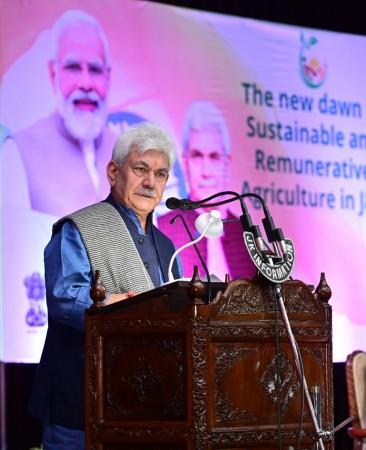Jammu and Kashmir has rolled out the "Aspirational Panchayat Development Programme" in the union territory (UT) and to select the most backward 285 panchayats (one panchayat per block) for their holistic development, Jammu and Kashmir Lt. Governor Manoj Sinha announced.
"An array of key parameters for the preparation of Panchayat Development Index to rate the various panchayats of the UT of Jammu and Kashmir on socio-economic indicators concerning the lives of the people residing in the rural areas has already been identified. This exercise will be taken upon the analogy of Aspirational Block Development Programme being implemented by the UT of Jammu and Kashmir," an official statement said on Wednesday.
"A total of 100 measurable indicators have been identified across nine sectors -- Agriculture & Allied Activities (6 indicators), Health and Nutrition (11), Education (13), Rural Development and Sanitation (7), Beneficiary-Oriented Schemes (4), Skill Development (4), Basic Infrastructure (17), Environment (5) and Good Governance (33), which will give insight of existing status and incremental progress over a period of time."

On the basis of importance of these sectors, weightage will be assigned to each sector and sub-indicators as per relevance in the life of rural population.
These aspirational panchayats would be developed through convergence of various ongoing district/UT schemes and centrally sponsored schemes/ programmes.
Additional financial assistance of Rs 10 lakh would be provided to the selected panchayats under the scheme for its further development after achieving saturation in the following parameters like soil health cards, land passbooks, Kisan credit cards, Shram cards issued to eligible labourers, 100 per cent institutional births, 100 per cent vaccination of children in the age group of 9-11 months, zero per cent out of school children, 100 per cent solid waste collection and treatment, Aadhaar seeding with MGNREGA cards, issuance of golden cards under PMJAY SEHAT.
Nearly 285 most backward panchayats would be selected from 4,291 panchayats of J&K (one panchayat per block), on the basis of least aggregate score obtained on the selected 100 parameters/indicators in the Panchayat Development Index in the concerned block.
The data would be analysed in Planning Development and Monitoring Department, and most backward panchayat in the block would be identified, the details of which would be shared with all respective District Development Commissioners for their authentication.
Aspirational Panchayat Development Programme (APDP) dashboard would be developed by the IT Department for uploading the data of all panchayats on the selected indicators/parameters. Subsequently, APDP dashboard would be used to monitor the progress of these aspirational panchayats on key performance indicators.
'Holistic Development of Agriculture & Allied Sectors' scheme

On Wednesday, LG Manoj Sinha announced the 'Holistic Development of Agriculture and Allied Sectors' scheme on Wednesday, officials said. The project has been approved by the J&K Administrative Council, chaired by Sinha.
"The committee working in a mission mode came with a comprehensive plan in the form of 29 projects covering all the sectors within the ambit of Agriculture Production Department in a record time of five months. The unique thing about these projects is not only that they have been prepared by some of the finest brains in the country but also the fact that their formulation was undertaken in a consultative mode -- ensuring that the opinion of all stakeholders, including our farmers are taken onboard," an official statement said.
"These 29 projects will nearly double the output of the sectors, boosting exports and making the sectors sustainable and commercially viable. These gains will be equitable, reaching the last person in the mile and ecologically sustainable through efficient use of bio-resources for food, feed and industry. The agricultural output which stands at Rs 37,600 crore will increase by more than Rs 28,142 crore to reach more than Rs 65,700 crore per year, with a resultant increment in sectoral growth rate to 11 per cent."
"The interventions will create employment opportunities for over 2.8 lakh youth and establish around 19,000 enterprises. More than 2.5 lakh persons will be skilled in various agri-enterprises ranging from seed production, precision farming of vegetables, bee-rearing, cocoon production, mushroom farming, integrated and organic agriculture, high-density fruit farming to processing, dairying, sheep and poultry farming as well as fodder production. In the next five years the UT will have a motivated workforce with agri-entrepreneurial skills in a commercially viable and ecologically sustainable agri-ecosystem."
(With inputs from IANS)

















